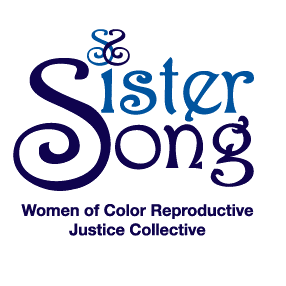SisterSong is a Southern based, national membership organization; our purpose is to build an effective network of individuals and organizations to improve institutional policies and systems that impact the reproductive lives of marginalized communities. SisterSong Women of Color Reproductive Justice Collective was formed in 1997 by 16 organizations of women of color from four mini-communities (Native American, African American, Latina, and Asian American) who recognized that we have the right and responsibility to represent ourselves and our communities, and the equally compelling need to advance the perspectives and needs of women of color. SisterSong defines Reproductive Justice as the human right to maintain personal bodily autonomy, have children, not have children, and parent the children we have in safe and sustainable communities.
Indigenous women, women of color, and trans* people have always fought for Reproductive Justice, but the term was invented in 1994. Right before attending the International Conference on Population and Development in Cairo, where the entire world agreed that the individual right to plan your own family must be central to global development, a group of black women gathered in Chicago in June of 1994. They recognized that the women's rights movement, led by and representing middle class and wealthy white women, could not defend the needs of women of color and other marginalized women and trans* people. We needed to lead our own national movement to uplift the needs of the most marginalized women, families, and communities.
SisterSong is the largest national multi-ethnic Reproductive Justice collective. We are dedicated to growing and supporting the RJ movement, and to uplifting the voices and building the capacity of our movement sisters to win access to abortion and all other reproductive rights.
SISTERSONG IS A:
- Thought Leader publishing the latest in RJ analysis, uplifting little-known RJ issues, and connecting RJ with other movements
- Movement Voice called on by the United Nations, White House, legislators, media, and leaders of large mainstream organizations to be the voice of RJ and women of color in the US
- Ambassador bringing RJ into the mainstream, and striving to make it as well-known as civil rights or women's rights
- Trainer drawing thousands into the movement, building the skills of mid-career activists, and training people in groups focused on other issues to integrate the RJ framework into their work
- Convener of the largest conferences of women of color working on RJ
- Facilitator of key collaborations of RJ groups coming together to raise our collective power in areas of great movement need
- Organizer mobilizing a large base of women of color and allies in rapid-response online and in-person action to quash threats to and grasp opportunities for the rights of marginalized women


